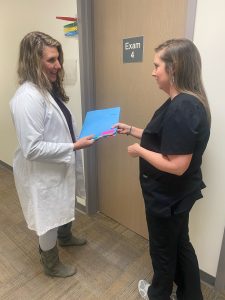Mississippi’s legalization of medical marijuana has led to hope for many patients and confusion for many practitioners, who must get mandatory training about the drug in order to approve patient use. Although medical marijuana has been legal in some states for more than a decade, according to the most recent data available, a significant percentage of practitioners receive no formal education about the medical consequences of marijuana use.
“I’ve been a physician assistant for 10 years,” Anna Burns, who practices at Oxford Orthopedics & Sports Medicine, said. “Medical marijuana was not very obvious or out on the radar [10 years ago], so really we didn’t have a lot of education … and even now, with being a provider and understanding the ramifications that will happen when I maybe have patients that are on these types of medications, there’s still a lot left to be determined.”
Mississippi’s medical schools have done little to educate students broadly about marijuana’s medical uses, according to one Oxford physician.

“I went to school at William Carey University, and I did my residency at the University of Mississippi Medical Center (UMMC). I had zero education about medical marijuana in either — with the one exception of there’s a medication for seizures called Epidiolex, which has a component from marijuana,” Dr. Megan Edwards of Oxford Neurology Clinic said.
A representative from UMMC responded to a request for information about the school’s medical marijuana instruction with an email stating that the school follows the recommended curriculum provided by the American Association of Medical Colleges (AAMC). However, in response to a request for information from the AAMC, a representative stated, “Neither the AAMC nor the LCME, the accreditor of medical schools, recommend or prescribe any curriculum to medical schools. Each school comes up with its own curriculum based on its mission and values.”
One current medical student at UMMC, who did not want to be identified, said that they have received detailed instruction about both the benefits of medical cannabis and the biological effects of it in one course taken with an instructor who also participates in the university’s cannabis research program. However, the student did not know if every student in the school is exposed to this information.
Both Burns and Edwards said they would be more likely to and more comfortable with certifying the use of medical marijuana if they had more education about the endocannabinoid system (the portion of the body on which marijuana acts) and the interactions it may have with other drugs.
“There’s still a lot, again, left to be determined in regards to the education on how it’s going to counteract with other medications and maybe, you know, things that I do in order to provide care for my patients,” Burns said. Right now, Burns has no plans to become licensed to certify patients for medical cannabis use.
PREPARING TO CERTIFY PATIENTS
As of early November, 448 patients had been approved for a medical marijuana card, and only 118 practitioners are licensed to certify medical marijuana use.
The initial requirement for Mississippi practitioners to be licensed to certify medical marijuana use involves eight hours of continuing medical education (CME) along with an extensive application process. The licensed practitioners must be registered with both the Mississippi Department of Health and their respective licensing boards. Following initial certification, a practitioner must earn five hours of CME each year.
Dr. Lane Pitts, a physician in the Hattiesburg area, has already completed the state-required CME, which consisted of seven Powerpoint presentations developed by physicians and other cannabis experts in the state. The education included state regulations affecting providers as well as the potential risks associated with medical marijuana. Pitts has not yet registered with the state health department or state licensing board.
“I found the state required/sponsored CME to be informative but very general in nature,” Pitts said. “Information regarding the specific types of marijuana that are anticipated to be available in the state dispensaries were not provided or available at the time. Certainly, I would like to learn more about this once further information is available.”
This lack of information as well as a lack of research due to marijuana being illegal at the federal level are two reasons why Pitts and other practitioners around the state are hesitant to get certified. Edwards is taking a slightly different, but equally cautious approach.
“So my plan is to do the training. I would like to do it mainly because I’m going to have patients who ask for it. This would qualify me to be able to give it, but I also just want to know what the process is going to be and kind of go from there,” Edwards said. Following the training, she says, she will decide if she feels comfortable authorizing medical cannabis for patients.
But not all physicians around the state are hesitant. Dr. Kirk Kinard, a pain specialist at Willow Pain and Wellness in Oxford, has already become licensed to certify patients for medical marijuana use and is opening new clinics around the state to help patients obtain medical marijuana cards.
“I think cannabis has as much a role there with the secondary pain behaviors, sleeping better, less anxiety, less social withdrawal, these kinds of things, when you can’t take all the pain away,” Kinard said. “And that’s really where my excitement for it comes.”
While Kinard is excited about new treatment opportunities for his patients, he also acknowledges that entering this field will be a learning process over the next couple of years.
“Our providers over time will become experienced with that and take the patient’s feedback and formulate a pattern of what has worked for what conditions or what age ranges naturally and really be able to help,” Kinard said.
Pitts said he already has patients asking about the treatment.
“Thus far, most of my patients that have asked about medical marijuana are interested in using it for chronic pain,” Pitts said. “It will be interesting to see if medical marijuana might help some of these patients get off of their current chronic prescription pain medications.”

The possibility that medical marijuana use could decrease patients’ dependence on prescription opioids was mentioned by many providers.
“I think (marijuana) fits before opioids or during opioid therapy to disallow escalation of opioids – potentially de-escalate or even replace – but you’ve got to be careful about that. Your goal doesn’t need to be to replace this with that. It needs to be improving the patient’s quality of life and function by giving them the fewest medications,” Kinard said about where marijuana fits into the timeline of treating chronic pain.
Other qualifying conditions for the use of medical marijuana include a variety of neurological disorders such as Alzheimer’s and Parkinson’s diseases, cancer and debilitating diseases that produce seizures or severe nausea.
Though these medical practitioners are taking steps to ensure they can help their patients, Edwards said the state could make it less of a burden to get educated.
“The issue with CME is that we have to pay for that,” Edwards said. “Even if I choose not to get my license for it, I want to be educated about it because I’m going to have patients on it. … You’re putting another burden on your physicians and other providers to understand that – whether they are licensed or not.”
The CME training costs $200, according to the health department. Edwards also points out that CME is more accessible on other topics.
“They should offer this education to us more readily and it shouldn’t be that we seek out the education,” she said.
All of the physicians agreed that medical practitioners in the state need to know more, whether they support the new law or not.
“It’s not that I’m for it or against it because I think there’s good and bad with it. We just need education,” Edwards said.
Reporter Loral Winn contributed to this report.


























